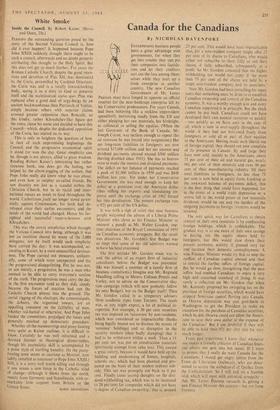White Smoke
Inside the Council. By Robert Kaiser. (Burns and Oates, 25s.)
PERHAPS the outstanding question posed by the story of the Second Vatican Council is, how did it ever happen? It happened because Pope John XXIII suddenly thought there ought to be such a council, afterwards and no doubt properly attributing this thought to the Holy Spirit. But this does not get us much further. For years the Roman Catholic Church, despite the good inten- tions and devotion of Pius X1.1, was dominated by the Curia, personified by Cardinal Ottaviani; the Curia was and is a totally inward-looking body, seeing it as a duty to God to preserve itself and the ecclesiastical status quo. Pius was replaced after a good deal of argy-bargy by an ancient backwoodsman then Patriarch of Venice, simply because others with superior claims aroused greater opposition than Roncalli; so this kindly, rather Khrushchev-like figure got the votes, chose his name and decided to have this Council--which, despite the dedicated opposition of the Curia, has started on its way.
This is only to heighten the question of how in face of such unpromising' beginnings the Council and the progressive ecumenical spirit it stood for won the day. Great simplicity can be, though is not always, allied to great wisdom. Reading Robert Kaiser's interesting but rather tiresome book, one does get the feeling, not helped by the elbow-jogging of the author, that Pope John really did know what he was about, and even how to outplay so-called friends. He saw disunity not just as a scandal within the Christian Church, but in its racial and inter- national nature an insult to God throughout the world. Catholicism ,itself no longer stood peren- nially against Communism, for both had de- veloped since their earlier encounters, and the needs of the world had changed. Hence his far- sighted and successful rapprochement with Khrushchev.
This was the sancta simplicitas which brought the Vatican Council into being, although it was not an intuition shared by many of the 2,000 delegates; nor by itself would such simplicity have carried the day: it was accompanied, ac- cording to Kaiser, by a most unsanctified devious- ness. The Pope carried out measures, unilater- ally, some of which were unexpected and (to the progressives) disappointing. For he was not, or not merely, a progressive, he was a man who seemed to be able to carry everyone's version of the truth. The progressives must carry the day in the first encounter (and so they did), simply because the forces of reaction had run the Catholic Church almost into the ground. The curial rigging of the electiops, the communiqués, the debates, the organised smears, arc an appalling comment on the fallibility of men, whether red-hatted or otherwiSe. And Pope John loaded the committees, prejudged the issues and generally mucked up democratic procedure.
Whether all the manoeuvrings and pussy-footing were quite as Kaiser outlines, it is difficult to know. Certainly he was well informed and a devoted listener at theological dinner-tables,
though his journalistic skill is accompanied by a prose style of startling banality. (In the pussy-
footing none seems so cautious as Montini, now safely installed as successor to Pope John XXII1.) Still, it is a story well worth telling and through it one senses a new force in the Catholic wind of change--although it blows from the north, mostly from Germany and Scandinavia, with re- markably little support from Britain or the






























 Previous page
Previous page